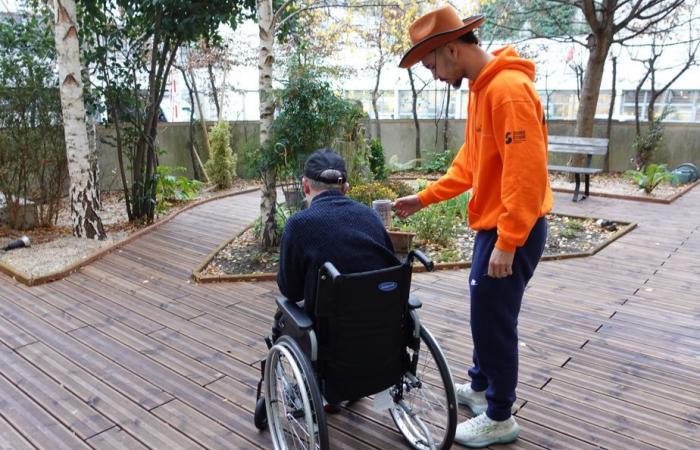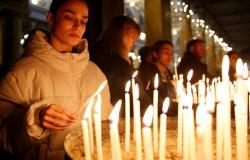
In a living room decorated with garlands and nutcrackers, a small table laughs while trying to form words in Scrabble. On one side of the stage, Jean-Michel and Thomas, two fifty-year-olds who live with motor and intellectual disabilities. On the other, Ahmed, a young person who, a few weeks ago, was in a situation of dropping out of school.
Published at 5:00 a.m.
Rafael Miro
Special collaboration
We are at the Clément-Würtz reception house, a residence for severely disabled people from 13e district of Paris. Around thirty people live in this establishment, most of them after having lost their autonomy due to a serious accident.
In addition to the ten employees who work here, the residents of the house have been able to count for several weeks on the help of Ahmed Farag and Léane Gagliano, two young people aged 16 and 21. All day long, they are busy leading activities, helping residents get around and, above all, talking at length with them. “They come to take care of us, they are very kind,” confides Thomas, his face full of gratitude.
Ahmed and Léane are not employees, nor volunteers, but “civic service” volunteers. This program, created in 2010 by the French government, allows 16 to 25 year olds to commit for 6 to 12 months to a public or charitable organization, paid by the State.
Helping young people in a bind
If the residents of the Clément-Würtz house are very happy to be able to count on the presence of Ahmed and Léane, it is especially the latter that this system is aimed at. Civic service was created, among other things, to give an opportunity to young people who face an unexpected situation or an impasse.
Léane, for example, has just completed a degree (the equivalent of a bachelor's degree in Quebec) in psychology, but was rejected last summer from all master's programs allowing practice.
If I hadn't done my civic service this year, I think I would have had to do a food job. I probably would have strayed from my goal. Finally, I have time to prepare for my return to studies and I have experience to use for the future.
Léane Gagliano, 21 years old
As for Ahmed, he comes from a disadvantaged background and, just a few months ago, was in the middle of dropping out of school. It was his school that spotted him and offered him part-time civic service, with 10 classmates. He devotes three days a week to civic service and returns to school on Thursday and Friday. “Since I started, I feel like I'm more motivated to go to class, whereas before, I didn't go at all,” he says.
One of the objectives of the program is to be as accessible to everyone as possible, regardless of training. “During interviews, we are not allowed to ask for a CV or ask questions about professional experience,” explains Flora Béreau, Ahmed and Léane’s tutor within the Unis-Cité organization. “What matters is only motivation. »
Civic service, however, is the subject of criticism. Young people receive compensation of around 600 euros ($900) per month, well below the minimum wage, of which 80% is covered by the state. Some associations are accused of taking advantage of this to hire young people at low prices, barely training young people, even though “it is obligatory”, deplores Flora Béreau.
At Unis-Cité, Ahmed and Léane participate every week in training workshops on psychology or the associative environment.
Create vocations
Ahmed and Léane chose to do their civic service with people with disabilities, but it is possible to choose a whole range of different commitments. For example, some young people spend their civic service raising awareness of environmental causes, or even participate in heritage preservation.
One of the most popular programs is the “senior solidarity civic service”, which allows you to get involved with older people. “It confirmed to me that I wanted to work in the healthcare sector,” explains Julie Schlitter, a volunteer hired for eight months in a residence for the elderly in 16e arrondissement.
It is not uncommon for volunteers to find their vocation during their commitment. “Honestly, I don't know if I'm going to continue school after high school,” Ahmed admits, hosting the coffee break from the kitchen counter, one of his favorite moments with the residents. “But now, I think I would like to continue working in a residence like this. »





